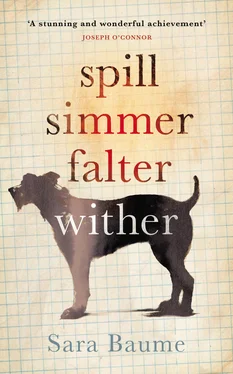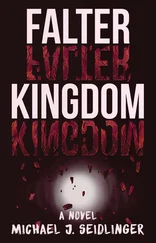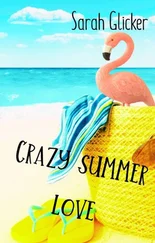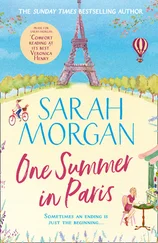I didn’t know those people, not really. I knew their mass faces and their mass clothes from decades of Sundays we’d worn down the kneelers together. I’d only ever spoken to a couple of neighbours and only then since my father’s been gone, only then in answer to the questions they asked about him. A nursing home in the city, I told them. And I didn’t mean anything by it, by HORNET. There was a man kneeling in front of me wearing a jacket with a label on the back, and the label read THE NORTHFACE, and I was making anagrams; that’s all it meant. Then I walked out. I cleared the churchyard and was through the gates and in the car before anyone had followed me, if anyone even tried. I didn’t stop to check, but I don’t expect so. And then I realised I didn’t have to go to mass on my own any more, that I’d only ever gone as my father’s companion and now that I’d made the old man’s excuses several times over, I didn’t have to go, and I felt suddenly very stupid for all the times I had.

When I was a boy, I used to sit here in this window and watch children with satchels and lunchboxes passing on their way to school. Back then, hard as it is to picture now, I was small, almost as small as you. Small enough to scrunch my whole body onto the sill. Back then, I didn’t care about being seen. I’d press my nose against the pane and draw snot trails, just like you. I knew every child by sight and I remember them all: the girl who wore her hair in jade ribbons, the boy with iron calipers up to his knees. I imagined the details of all the parts of their lives I couldn’t see, from the contents of their pencil cases to the exact number and colour of stars stuck in their copy books. Even though I’d stare at the crowns of their heads every morning, I never wanted to join them. I was too shy, too frightened. And besides, I didn’t really believe I was of the same species as the children I saw passing along the sea front, going to school. Back then, it never dawned on me that I should have the things they had too. I would have to be made again, I thought. I would have to be reborn.

I know you’re too short to see it, but the picture on our kitchen calendar is a donkey in a sand dune with ribbons fanning from its quadrilateral face like the tails of a kite. It’s summer here in the kitchen, even if, outside, it’s heartily raining. Outside, every porous thing is turning spongy, every un-porous thing is sluiced and dripping.
Still, people are mowing their lawns and dousing their barbeques with lighter fluid and standing under patio heaters nibbling black meat from toothpicks. I smell their cut grass in the day time, their charcoal smoke by night. Can you smell it too? The ice-cream van comes out of hibernation and drives in circles jingling You are my sunshine, my only sunshine and its fog lights through the gloom every dusk are indeed the sunshine, the only sunshine, as though it knew. People are performing the summer on the summer’s behalf, buying flip-flops and body-boards, tricking themselves into believing it’s the season inside their TV sets instead, the one from the Australian soap operas. They are pretending, as though pretending alone might a miracle make.
With such little sign of a change in season, how do the plants know it’s the right time to flower? Because plants are smart in a way people aren’t, never questioning the things they know nor searching for ways to disprove them. All along the road through the forest to the refinery, see how foxgloves split from their buds and tremble over the ditches. And when the weight of their waterlogged bonnets is too much, they keel into the road and their heads are crushed by cargo lorries to a pretty pink pulp.

On the beach, most days the mist is so thick that when we reach the mid-point and stop to look, neither end of the strand is visible, each taking its turn to be scarfed up by cloud. Now we must part a channel through the fog like a pair of tiny jets leaving a pair of reverse contrails in our wake.
Through the thick mist a honeycomb collie comes careering down the strand toward us, his great mane crimped by damp and billowing. He’s already too close before I see him, and there’s no chance to re-shackle you; you’re ahead by almost fifty feet. In a flash you’ve forsaken your football and clamped the collie’s muzzle. Now he’s yelping and flaying and trying desperately to hurl you off. But you don’t budge a hair’s width. You’re stuck as a mouse in a mousetrap, a fly to a flypaper. The collie looks like a prestige pet and the woman he belongs to looks like she prizes him for his placid face and handsome cantering, for his particular pedigree as opposed to his particular self. She’s speedy out of the clouds and to his rescue, speedier than me and my fifty feet. Now she’s clubbing your head with a golf umbrella, and all I can do is shout.
‘DROPPIT ONE EYE!’ I shout, ‘DROP!’
It’s happening so swiftly, too swiftly for my ordinary fears to keep up with. It’s as if the helmet of my spacesuit has been perforated and a flood of oxygen is crashing into my eyes, ears, mouth.
‘DROPPIT DROPPIT DROPPIT!’
But you don’t, and even though I’m pitching and clumping as fast as I’ve ever pitched and clumped, flailing like a plastic bag snagged on a thorn in a gale, for a split second, everything goes completely still. The waves stop and the sea turns to cement. A greater-black-backed gull mid-flight halts the smacking of his mammoth wings, lies rigid in the sky.
‘DROPPIT ONE EYE!’ I shout, ‘DROP!’
Now the woman manages to sever you from the collie’s muzzle. As I catch up, he scampers for his life and she beats after him waving her umbrella in the air and crying HENRY HENRY HENRY into the fog. Her voice is so high and sharp, it cleaves through me, and perhaps this is the most unsettling part of all, because people never use such an excited pitch in my presence. People always lower and deaden their tone when speaking to me, as though our conversation is immediately unbearable.
You go to chase them but I grab you. Now I feel as though I’ve left my stomach behind me, as though it dropped out several yards ago and is lying on the sand, quivering globulously. My hands are shaking as I smooth them across your face and neck and back and legs, as I pat you over to check for wounds. My palms come away blotched with red, but there’s no sign the blood belongs to you. You’re intact, and looking up at me with tongue lolling idiotically, tail skipping. With eye and tongue and tail, you’re begging a chocolate treat, expecting my approval.
I don’t know what to do with you. I don’t know whether I’m furious or frightened or a little of both.
I turn and hurry us back in the direction of the fields. I stop only to scoop up the football before reaching the brow of the hill. Now the beach has vanished again. The mist is sitting in the sky like the froth churned up by angry waves sits on the sea in stormy weather. I can’t see the car park on the opposite cliff and I can’t see Henry or his woman or the umbrella. But I notice the place where the sand’s been churned up by our dashing, hurling, thrashing feet. And the black smear of a gull’s wingspan. Flying again. Growing smaller, smaller, smaller.

My father had a golf umbrella. It was dark blue, as dark as blue can be before becoming black. And he brought it with him every time he left the house, his house, even if it wasn’t raining.
Читать дальше













